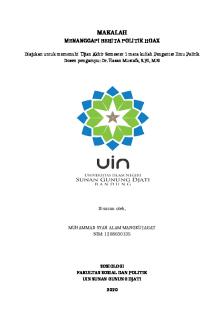Eskimo Vocab Hoax Questions PDF

| Title | Eskimo Vocab Hoax Questions |
|---|---|
| Author | Beth Faszer |
| Course | Languages of the World |
| Institution | Kwantlen Polytechnic University |
| Pages | 1 |
| File Size | 78.8 KB |
| File Type | |
| Total Downloads | 26 |
| Total Views | 119 |
Summary
Dr. Paivi Koskinen...
Description
Linguistics 1300 Assignment 5 – The Great Eskimo Vocabulary Hoax Beth Faszer 1. According to the article, the original source of this myth is Franz Boas' 1911 Handbook of North American Indians. The problem apparently arose when an amateur linguist, B. L. Whorf, misinterpreted and inflated Boas’ statement about the Eskimo language having multiple root words for “snow”, much as in the same way English employs different roots for different forms of water. English itself, in fact, could have formed different roots for its many phrases about snow, and Whorf’s statement that English refers to snow with an all-inclusive word is ironically incorrect. His article, however, though misleadingly regardless of “lack of little things like verisimilitude and substantiation” (3), was subsequently reprinted and quoted. 2. According to Pullum, the myth proliferates out of sheer “sloppiness” and a willingness to believe interesting things without demanding evidence. It is easy to believe strangesounding information about something or someone equally unfamiliar. Though developed accidentally, the myth continually evolves and reappears. As Pullum notes, one such way in which distortion of detail occurs is as writers quote prior sources in increasingly misrecollected second, third, and fourth-hand accounts. 3.
Pullum argues that Whorf’s overgeneralizations of Boas’ original work, as well as multiple subsequent misattributions, perverted citations, and successive arbitrary statements, show that this myth is incorrect. Whorf was hardly qualified to make the assumptions that he did.
4.
Pullum has two points that claim this myth should actually be unimportant to begin with. Firstly, any specialist has multitudes of specific words, known as jargon, to describe his or her specialty. Even if the Eskimo did have many words describing snow, that would hardly be unique, but rather most certainly expected, as they must encounter it so often. The second point is that specifically because they encounter it so often, they would more than likely display little interest in it for exactly that reason. It becomes so commonplace, like sand on a beach, that it might largely be ignored altogether.
5. I think Pullum wants his reader to learn that just because something is widely quoted, it may not necessarily be correct. This article demonstrates the ease and rapidity with which inaccuracies may be spread, and warns against blindly accepting information without first accumulating proper evidence. Pullum also notes that though it is also very difficult to eradicate a false but well-established belief, he suggests his reader might even refute this hoax should they be exposed to it....
Similar Free PDFs

Eskimo Vocab Hoax Questions
- 1 Pages

BERITA HOAX DI MEDIA SOSIAL
- 7 Pages

Vocab
- 26 Pages

Materi Anti Hoax
- 30 Pages

Stats Vocab
- 3 Pages

Vocab - sxnn
- 17 Pages

Apush Vocab +
- 4 Pages

Genetics Vocab
- 5 Pages

Apush Vocab
- 1 Pages

Final Exam Vocab
- 8 Pages

Macroeconomics chapter 15 vocab
- 1 Pages

Chapter 7 Vocab
- 2 Pages

Leccion 7 Vocab
- 1 Pages

Myers Psychology Vocab
- 17 Pages
Popular Institutions
- Tinajero National High School - Annex
- Politeknik Caltex Riau
- Yokohama City University
- SGT University
- University of Al-Qadisiyah
- Divine Word College of Vigan
- Techniek College Rotterdam
- Universidade de Santiago
- Universiti Teknologi MARA Cawangan Johor Kampus Pasir Gudang
- Poltekkes Kemenkes Yogyakarta
- Baguio City National High School
- Colegio san marcos
- preparatoria uno
- Centro de Bachillerato Tecnológico Industrial y de Servicios No. 107
- Dalian Maritime University
- Quang Trung Secondary School
- Colegio Tecnológico en Informática
- Corporación Regional de Educación Superior
- Grupo CEDVA
- Dar Al Uloom University
- Centro de Estudios Preuniversitarios de la Universidad Nacional de Ingeniería
- 上智大学
- Aakash International School, Nuna Majara
- San Felipe Neri Catholic School
- Kang Chiao International School - New Taipei City
- Misamis Occidental National High School
- Institución Educativa Escuela Normal Juan Ladrilleros
- Kolehiyo ng Pantukan
- Batanes State College
- Instituto Continental
- Sekolah Menengah Kejuruan Kesehatan Kaltara (Tarakan)
- Colegio de La Inmaculada Concepcion - Cebu

